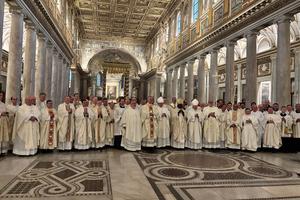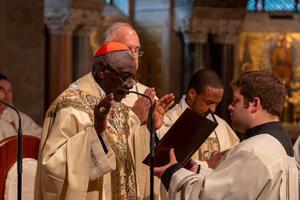Cardinal Sarah Confirms Vatican Retains Last Word on Translations
In a new article, the prefect of the Congregation for Divine Worship discusses the effects of the Pope’s recent revisions to canon law governing liturgical translations.

VATICAN — Cardinal Robert Sarah has weighed in on Magnum Principium, Pope Francis’ motu proprio on liturgical translations, reassuring the faithful that the Vatican will continue to safeguard any changes or new liturgical translations to ensure they remain faithful to the original Latin.
In an article in the French Catholic journal L’Homme Nouveau, the prefect of the Congregation for Divine Worship and the Discipline of the Sacraments (CDW) confirmed that the motu proprio’s change to Canon 838 — which shifts some responsibility for translating liturgical texts away from the Vatican to local bishops — will still require the Vatican to give approval to any such changes or translations.
The article, officially dated Oct. 1 — the day on which Magnum Principium (The Great Principle) came into effect — bolsters the guidance issued with the motu proprio by Archbishop Arthur Roche, secretary of the CDW. Archbishop Roche stressed that the Vatican’s role in confirming texts remains an “authoritative act” presupposing “fidelity” to the original Latin.
Cardinal Sarah’s statements on the matter contradict those who see the motu proprio as a gateway to more liberal vernacular interpretations of liturgical texts, inconsistent with their Latin original.
The Holy Father, who signed Magnum Principium Sept. 3, authorized changes to Canon 838 that decentralized the translation process, giving local bishops responsibility for translating liturgical texts, while retaining the Vatican’s authority to approve or reject a proposed translation.
The CDW will no longer instruct bishops to make proposed amendments, but retains authority to confirm or veto the results at the end of the process.
Among other consequences, this means that the Vatican commission Vox Clara, which was established by Pope John Paul II in 2002 to help the CDW vet English translations, will no longer be needed.
The Pope said he made the changes because of “difficulties” that unsurprisingly have sometimes arisen between the Vatican and bishops’ conferences. He added that he wanted “a vigilant and creative collaboration full of reciprocal trust” between the Holy See and bishops’ conferences, so that the renewal of “the whole liturgical life might continue.” It, therefore, “seemed opportune,” he said, “that some principles handed on since the time of the Council should be more clearly reaffirmed and put into practice.”
The Pope added that, having listened to the recommendations of a commission he had created to look into the matter, he wanted to make the collaboration between the Vatican and bishops’ conferences “easier and more fruitful,” in accordance with the Second Vatican Council constitution on the liturgy, Sacrosanctum Concilium, and Blessed Paul VI’s 1964 motu proprio Sacram Liturgiam.
Liturgiam Authenticam
In his article, Cardinal Sarah begins by reasserting that the “authoritative text” concerning liturgical translations remains Liturgiam Authenticam, the 2001 instruction issued by the CDW, that aimed to ensure “insofar as possible” that texts must be translated from the original Latin “integrally and in the most exact manner.”
For this reason, he continues, the faithful translations carried out and approved by bishops’ conferences “must conform in every way to the norms of this instruction.”
The cardinal then focuses primarily on the two key changes to paragraphs of Canon 838: the first that states the Holy See is to “recognize” (recognitio) adaptations to texts by bishops’ conferences; and the second that states the Holy See is to “confirm” (confirmatio) translations that are “faithfully” prepared by bishops’ conferences and approved and published by them after the Holy See’s confirmatio.
He stresses that the recognitio “protects and ensures conformity to the law and the communion of the Church (its unity),” while the confirmatio “must only” be granted by the Holy See if, after examining a translation, it deems the translation “faithful” and consistent with the Latin based on Liturgiam Authenticam’s criteria.
Furthermore, Cardinal Sarah underlines that both the recognitio and the confirmatio are “by no means a formality” and cannot be granted after a “rapid review” of the work. He also adds that the confirmatio “presupposes and implies a detailed review” by the Holy See and the possibility that translations may be rejected if they are found not to be faithful to the Latin. Such a decision, the cardinal affirms, “would be binding” on the bishops’ conference.
He adds that this clarification corresponds with Archbishop Roche’s guidance notes on the motu proprio.
The changes, the cardinal continues, do not “alter the responsibility of the Holy See and thus its authority with respect to liturgical translations.” Rather, he says, the Holy See must continue to evaluate whether any changes are “truly faithful” to the Latin in order to safeguard Church unity.
Concluding Comments
After explaining how the recognitio and confirmatio will actually lead to better and more faithful adaptations and translations of liturgical texts, Cardinal Sarah ends by stressing how important such a process of consultation and approval is, in evaluating all kinds of human endeavors, to ensure we have done them “to the best of our abilities.”
“Our life is thus a tapestry of recognitio and confirmatio that allows us to advance with the greatest fidelity with respect to the demands of reality,” he says, adding that the process in this context is no different.
He closes by quoting the Holy Father’s letter of Sept. 26 to bishops’ conferences, praising the Pope for “admirably” saying it is a question of making the collaboration between the Vatican and the bishops’ conferences “easier and more fruitful.”
Full text of Cardinal Sarah's article entitled: "A humble contribution for a better and accurate understanding of the Motu Proprio Magnum Principium":
Cardinal Robert Sarah's Commentary on Magnum Principium
Edward Pentin is the Register’s Rome correspondent.
- Keywords:
- cardinal robert sarah
- congregation for divine worship and the discipline of the sacraments
- edward pentin
- liturgical translations

















